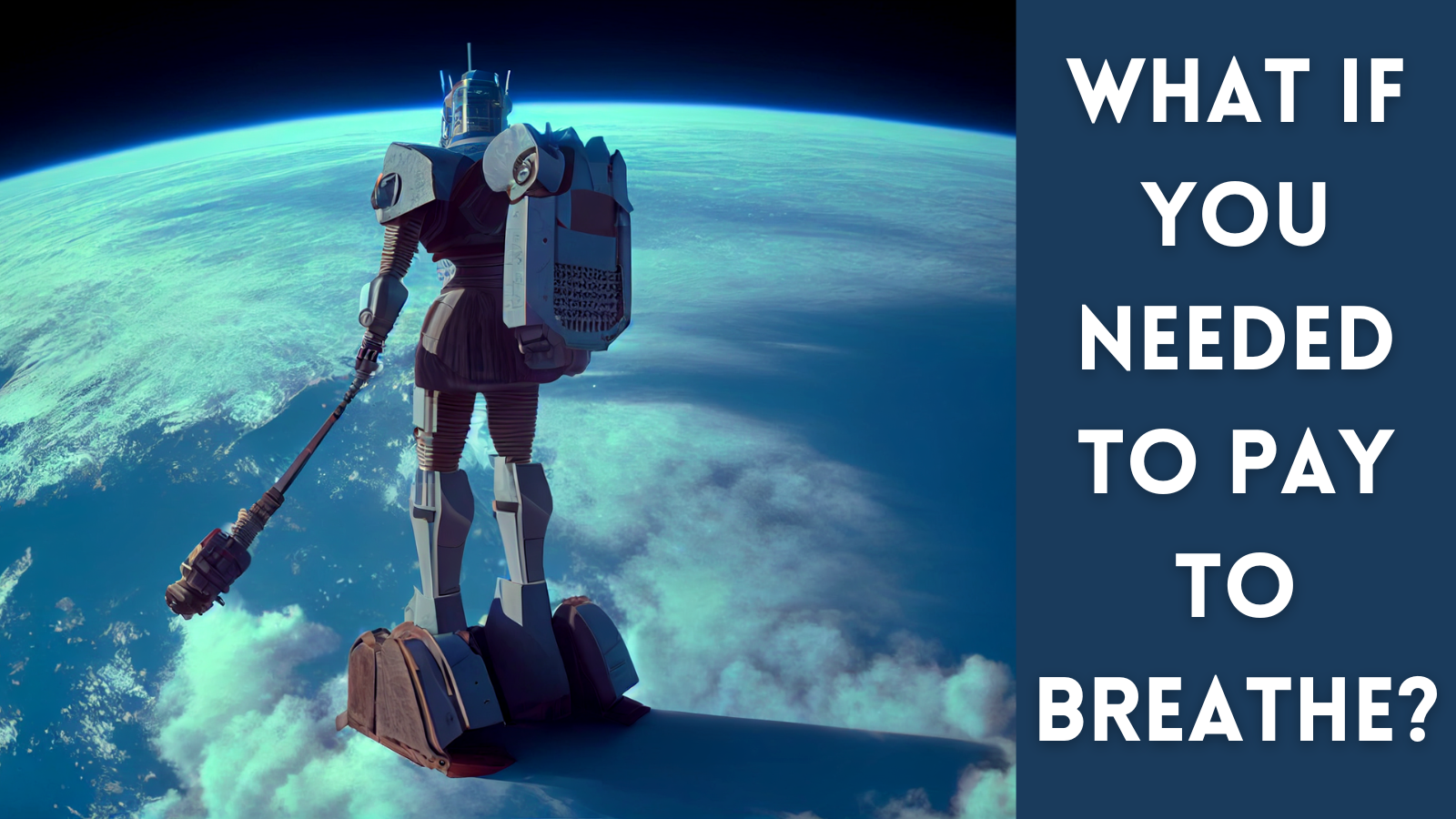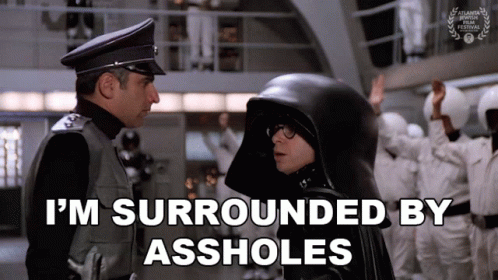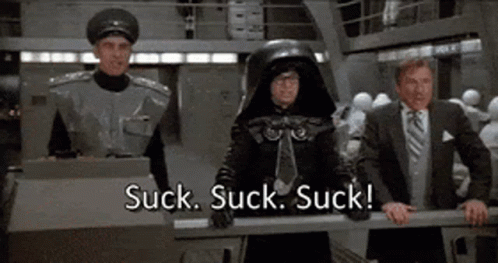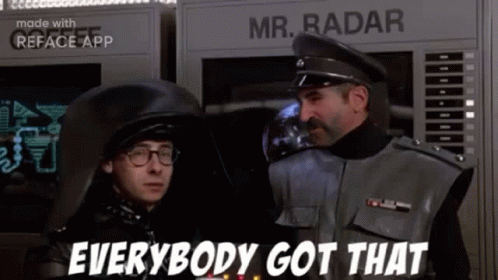The Spaceballs Argument for Unconditional Basic Income (UBI)


There is an argument frequently made against the concept of unconditional basic income (UBI) that essentially goes like this: "Life requires work. You can't just expect to live without work, and it's wrong for someone to live off the work of others. So UBI has no moral justification." This argument usually comes from conservatives and libertarians, and what often comes to my mind in response is Spaceballs. Therefore, I think of the following as the Spaceballs Argument for UBI.
In the movie Spaceballs, a giant spaceship transforms into a giant robot maid complete with giant vacuum cleaner, which is then used to suck up all the air from planet Druidia. Why do I think of this scene as an argument for UBI?
Imagine it were actually possible for one person to own a machine that sucked up all the oxygen in our atmosphere, and that the air we need to breathe to live was then sold to us in cans of Perri-Air like in Spaceballs. We could then work jobs in order to get paid money to then buy the air we need to live. Sound fair? This is the kind of deal that only a planet full of assholes could support as morally justified.

The thing is though, this isn't that far from what we actually did here on Earth centuries ago. Land used to exist without a monetary cost to access it. That was the natural way of things prior to the private property system and monetary system. We created poverty as we know it. This is what Founding Father Thomas Paine built his argument on back in 1797 when he published Agrarian Justice.
"The first principle of civilization ought to have been, and ought still to be, that the condition of every person born into the world, after a state of civilization commences, ought not to be worse than if he had been born before that period."
Around this first principle, Paine constructed his argument for the universal provision of money to everyone upon reaching age 21. He wished to "remedy the evils and preserve the benefits" of a civilization that was creating a level of poverty that didn't exist pre-civilization when people could forage and hunt for food. We all would have inherited land, or at least free access to it, but in the process of creating civilization as we know it, we became dispossessed of our natural inheritance. That's a root problem that causes a lot of other problems despite all of the benefits it also brings.
"It is a position not to be controverted, that the earth, in its natural uncultivated state, was, and ever would have continued to be, the COMMON PROPERTY OF THE HUMAN RACE. In that state every man would have been born to property."
Just like in Spaceballs, the air belonged to everyone on planet Druidia. It was theirs. No one really thought of it that way though. It was just free and the common property of all Druidians. That is until the people of planet Spaceballs decided to privatize it as theirs, everyone who needed it to breathe be damned.

Paine's solution to the problem that civilization already exists but has dispossessed people of what otherwise would have been common property was to propose that when we mix our labor with natural resources to create something, we own the improvement only, and not the actual stuff that comprises it. And since we can't separate the improvement from the stuff, people who use the earth to make stuff should pay a percentage to everyone who lost access to the earth the stuff was made out of.
"It is the value of the improvement, only, and not the earth itself, that is individual property. Every proprietor therefore of cultivated lands, owes to the community ground-rent; for I know of no better term to express the idea by, for the land which he holds: and it is from this ground-rent that the fund proposed in this plan is to issue."
Something like this actually exists in one place on Earth where the residents of Alaska have decided that the oil underneath their feet belongs to all Alaskans, so oil companies should pay the people of Alaska for the privilege of sucking it out of the ground. This revenue goes into a state-owned fund which has paid a dividend to all Alaskan residents every year since 1982. In this way there is a recognition that oil companies owe a "ground-rent" to the people of Alaska and don't just get the oil they want for free. This is very different than in Spaceballs.
In the case of what happened in Spaceballs, it was obviously wrong for the people of planet Spaceballs to steal all the air from the people of Druidia, but what if they'd actually already done it centuries before the events of the film, and instead of taking all of it, they sold it back to the people of Druidia? What if it had just become a normal way of living that people should work to pay for air to breathe? What if it were normal to tell people who were not getting enough air to breathe that they should just go get a job? What if a common belief became that because everyone worked to breathe, that if some people just got air without working for it, that they were essentially stealing air from those working for theirs? That would suck, right?

It shouldn't be that hard to imagine because that's pretty much the world we live in right now. There's enough food for everyone, especially in the United States where we waste 40% of all the food we produce, and stocked grocery stores exist alongside food banks, but it's a common occurrence to tell people going hungry that they should just get a job to buy food. It's also common to believe that a government program like food stamps is essentially stealing from those who work for food by taxing the income from their work. And this is all based on it having been deemed okay to privatize land and resources and prevent people from using it without permission slips called "money" that can be obtained by doing what property owners want done.
What's normal is not okay though. It's not okay to legislate starvation and then use the threat of starvation in order to coerce people into doing stuff. There's nothing libertarian about that. There's nothing pro-freedom about that. It's just something a planet full of assholes would do.
If we don't want to be a planet full of assholes, I suggest we do what Thomas Paine proposed centuries ago. Let's just recognize that Earth actually does belong to all of us, everyone in the present and future, and that those who own pieces of it, and who create things out of it, owe compensation to the rest of us for removing our access to what would otherwise have been common property.
Universal unconditional basic income should be seen as fully justified compensation for the loss of the commons. If food is going to cost money to grant permission to eat it, then just provide people enough money to buy the food they need to live. That's not to say that all food should be free regardless of quantity and quality, just that a basic amount of money sufficient to buy a basic amount of it should not remain withheld for any reason. People who want a lot more food, or a lot nicer food would still be free to work for more money to earn access to eat beyond the basics of existence, as well as everything else they want beyond basics.
No one should ever think it's okay to suck up all the air and then sell it to us on the condition we work for it. The air belongs to all of us, and if we want private property to keep existing because of all the benefits of a private property system, then the cost of that system is unconditional basic income. No one should view UBI or taxes as immoral when what's immoral is the system so long as it exists without UBI.
If it's wrong to choke or starve someone unless they do what you want, then it's wrong to withhold air or food from someone unless they do what you want. It is a violent and immoral act to do those things, and thus it's also violent and immoral to continue withholding basic income. Just because we live in a Spaceballs world where it's normal to privatize the air and charge people to breathe doesn't mean we can't do as Thomas Paine proposed and "preserve the benefits of what is called civilized life, and to remedy, at the same time, the evil which it has produced" by compensating us all with a monthly basic income as an indemnification for the loss of our natural inheritance.
Basic income is basic compensation. It is a human right in recognition of what was once, and would have remained, the common property of the human race.


Do you want more content like this? Please click the subscribe button and also consider making a monthly pledge in support of my UBI advocacy work.
Special thanks to my monthly patrons: Gisele Huff, Haroon Mokhtarzada, Steven Grimm, Matthew Cheney, Katie Moussouris, Tricia Garrett, Zack Sargent, Larry Cohen, Frederick Weber, CanadayVibes, Kerry Bosworth, Laurel gillespie, Dylan J Hirsch-Shell, Tom Cooper, Michael Tinker, Robert Collins, Daryl Smith, ace bailey, Daragh Ward, Andrew Yang, Bridget I Flynn, Peter T Knight, David Ihnen, Myles McLane, Elizabeth Corker, Gray Scott, Gerald Huff, Albert Daniel Brockman, Michael Honey, Natalie Foster, Joe Ballou, Chris Rauchle, Arjun, chris heinz, Pavel S, Zachary Weaver, Juro Antal, Herb, Justin Seifert, Jodi Sarda, Rosa Tran, Deanna McHugh, Ryan Ash-Miller, miki, Adam Parsons, bradzone, Lee Lor, Akber Khan, John Sullivan, Team TJ, Yang Deng, Yan Xie, Marie janicke, Iggy C, engageSimply - Judy Shapiro, Phuong Truong, Tim , Warren J Polk, Timothy P O'Connor, Jeffrey Emmett, Stephen Castro-Starkey, Oliver Bestwalter, Kev Roberts, Walter Schaerer, Loren Sickles, anti666, Eric Skiff, Thomas Welsh, and Kai Wong.
_large.jpg)
UBI Guide Newsletter
Join the newsletter to receive the latest updates in your inbox.



